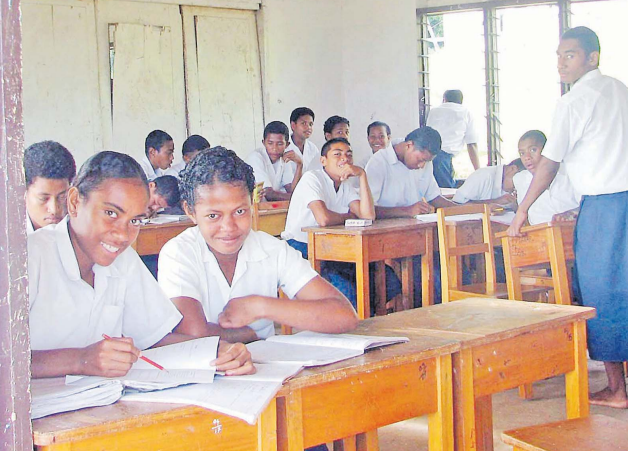It takes courage to face the press and answer the public’s concerns, but real courage lies in effecting the change our schools desperately need. The challenge facing our schools requires immediate action — it is an urgent need that cannot wait for bureaucratic convenience.
Voices of our people
The outcry from stakeholders, teachers, parents, and students across Fiji has reached a crescendo that can no longer be ignored. From Ba Civic Centre to FNU Nasinu Campus, from urban centres to rural communities, the message is unanimous: — our education system is failing our children, and reform is needed now.
The promise of ‘free education’ rings hollow. Since its introduction, the Free Education Grant has eroded so significantly that primary schools receive less than $1 a day per student — barely covering a single pen, let alone the comprehensive education our children deserve.
The Australian Infrastructure Assessment Report highlights what educators know, and our children face. Schools are overcrowded and over half have structural defects that compromise student safety and learning.
At the recent consultation, a Dudley student said, “There are about 50 students in a class, … too much for a teacher to handle.”
Walk through any classroom and you will find schools making impossible choices: repair leaking roofs or purchase books, maintain sanitation or invest in technology, address structural damage or provide learning materials. These should not be either — or decisions if we claim to prioritise education.
We also cannot tout 98 per cent literacy rates when 43 per cent of our Year 8 students fail English and non-readers enter high school. This disconnect between rhetoric and reality undermines the credibility of our entire education system and does a disservice to our children struggling within it.
There is growing consensus that something fundamental has gone wrong.
The consequences extend far beyond classrooms. When young people cannot read warning labels, comprehend health information, or understand the risks associated with substance abuse, they become vulnerable to the very crises plaguing our communities.
Fiji’s escalating drug problem and rising HIV infections are not isolated social issues — they are symptoms of an education system that has failed to equip our children with basic comprehension and critical thinking skills needed to make informed decisions about their lives and health.
Education’s economic effect
The business community has recognised the economic implications of educational decline. The Fiji Commerce & Employers Federation warns our current trajectory threatens decades of economic progress. As Edward Bernard says: “Employers across sectors struggle to find qualified workers, forcing expensive overseas recruitment or costly remedial training. This skills mismatch is a direct consequence of an education system that has not evolved to meet economic needs.”
The costs extend beyond economic productivity. Poor educational outcomes create social costs that burden our healthcare system, criminal justice system, and social services.
Education Act review
Yet within this crisis lies opportunity. The review provides a once-in-a-generation chance to fundamentally restructure how we approach education. We cannot afford to waste this moment on cosmetic changes or political compromises that fail to address underlying systemic issues.
The process has unleashed a flood of feedback that should alarm any policymaker committed to evidence-based decision-making. Public consultations nationwide have documented not just funding inadequacies but policy failures preventing effective education delivery.
Stakeholder feedback consistently identifies five critical areas where reform is desperately needed. Infrastructure investment must be prioritised, not just for new buildings but for maintaining the schools that communities built with their own resources. Curriculum modernisation cannot wait for perfect conditions when students are graduating without the skills needed for today’s economy. The decline in teacher morale, stemming from insufficient resources, is impacting the quality of education delivery, as reported by frontline educators. Addressing teacher development is crucial to retain qualified professionals who are currently seeking better opportunities. The call for employer consultation mechanisms reflects a broader recognition that education cannot exist in isolation from economic reality — when graduates cannot find employment because their skills don’t match market needs, we have failed both our students and the economy they should be serving.
Most importantly, all stakeholders demand implementation that moves beyond rhetoric -—don’t just talk, act. Increase the FEG, review policies that limit community corroboration and allow targeted fees because the investment required, in the limited time to make necessary improvements, is too great for government alone. Parents should be involved — it’s simple arithmetic.
The path forward
Moving forward requires courage from our political leaders, commitment from our communities, and collaboration between government and the religious and community organisations that built and manage 96 per cent of our schools. These institutions have demonstrated their commitment to education through decades of service. They deserve to be treated as partners, not obstacles, in the reform process.
The review provides the legislative framework for these changes, but implementation cannot wait for perfect conditions or complete consensus. Everyday we delay reforms, even simple policy changes, we deepen infrastructure deficits, widen equity gaps, and compromise the educational outcomes of our children.
We call upon Government to embrace bold reforms that match the scale of the challenge. We ask parents and communities to engage actively in PTFA efforts and demand meaningful change. Most importantly, we ask all Fijians to remember that education is not a cost — it is an investment in our collective future. Every dollar invested in education generates multiple dollars in economic returns through increased productivity, higher wages, reduced healthcare costs, lower crime rates, and decreased social service demands. When we fail to invest adequately in education today, we pay exponentially more tomorrow in remedial programs, social services, and lost economic potential.
Our children sitting in overcrowded classrooms today will be the leaders, innovators, and citizens who shape Fiji’s destiny tomorrow. They deserve better than the status quo. The time for half-measures is over, transformative action is needed now.

